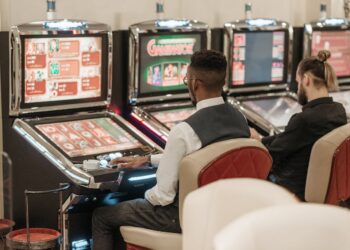What is a Virtual Reality Headset?
A Virtual Reality (VR) headset is a device that provides immersive digital experiences by simulating a 360-degree 3D environment. By carrying a VR headset, customers can have interaction with this environment in a way that feels intuitive and life like. The headset itself consists of quite a number technologies, inclusive of motion sensors, high-resolution displays, and spatial audio systems, all engineered to reply dynamically to person movements and movements. In the domain of online gambling, VR headsets are becoming instrumental, particularly in New Zealand, where they’re changing the user experience in environments like the best payout online casino NZ.
Latest Innovations in VR Technologies
VR technologies have been experiencing rapid advancements that are pushing the boundaries of realism and interactivity:
- Foveated Rendering – This technology optimizes the graphic rendering process by focusing more computational power on the area where the user is looking, enhancing the realism and quality of images.
- Hand Tracking and Gesture Recognition – Advanced sensors can track the movements and gestures of a user’s hands, removing the need for traditional handheld controllers. This makes interaction with virtual objects more natural and intuitive.
- Haptic Feedback – VR suits and gloves with haptic technology can simulate the sense of touch by providing tactile feedback. This significantly enhances immersion by letting users ‘feel’ the virtual environment.
- Multi-user Support – Through improved networking capabilities, VR platforms can now support multiple users in the same virtual space, offering opportunities for social interaction and multiplayer gaming.
- AI Integration – Machine learning algorithms can be used to personalize user experiences, adapting the virtual environment based on individual behavior and preferences.
History of Using VR Headset in Online Gambling
Initial Forays
The introduction of VR in online gambling began in the early 2010s. These first iterations were relatively simple, often just offering basic casino games like slots, blackjack, and roulette in a 3D setting. Nevertheless, they signaled the onset of a transformational phase for the online gambling industry.
Expansion and Diversification
As the technology matured, the range of VR-supported games began to expand. The potential for VR in recreating the visceral, tactile sensations of a physical casino started to be realized. Games that heavily depend on atmospheric and interpersonal elements, such as poker, became more authentic and engaging in a VR context.
Regulation and Adaptation
Regulatory bodies in New Zealand and other jurisdictions have recognized the distinct features and challenges posed by VR gambling. This has led to updated regulations that aim to ensure fair play and promote responsible gambling within VR environments.
Current Status
Today, VR is no longer a novelty but an integrated feature of many online gambling platforms. Gamblers can walk through virtual casinos, interact with other players, and engage in a range of games that go far beyond what traditional online platforms can offer.
Advantages of Using VR in Online Gambling
VR brings several key advantages to the world of online gambling:
Immersive Experience: VR enables an unprecedented level of immersion. From the casino’s backdrop to the subtle cues during a poker game, every detail can be rendered in lifelike 3D.
Enhanced Interactivity: Traditional online casinos limit interaction to clicking a mouse or touching a screen. VR casinos offer a much wider range of interactions, allowing players to move freely, gesture, and even communicate with others through voice chat.
Realistic Atmosphere: Through high-quality graphics and sound design, VR casinos can replicate the ambiance of a real-life casino, down to the smallest details. This heightened realism makes games like blackjack, roulette, and poker far more engaging.
Social Integration: With VR, online casinos can offer a more socially rich experience. Multiplayer games and virtual social spaces allow players to interact, discuss strategies, or simply chat, just like they would in a physical casino.
Increased Game Variety: VR technology opens up new possibilities for game design. Beyond traditional card games and slots, VR casinos can offer immersive story-driven games, intricate puzzles, and other types of interactive experiences that would be impossible to recreate on a 2D screen.
Using VR Headsets In NZ Online Casinos
Virtual Reality (VR) has been a transformative pressure in lots of sectors, and the online on line casino enterprise isn’t any exception. In New Zealand, a rustic regarded for its colorful gaming way of life and stringent regulations, VR is becoming increasingly more influential. VR headsets are ushering in a new era of immersive, interactive, and sensible gaming reports, dramatically converting the manner gamers interact with online casinos.
Technological Requirements
To get started with VR playing, one could need a VR headset, just like the Oculus Rift, HTC Vive, or PlayStation VR, in conjunction with a compatible computer or gaming console. The hardware necessities are commonly greater worrying in comparison to standard online gaming, so a reasonably high-performance gadget is typically essential.
Game Variants
VR gambling isn’t limited to any specific type of game; it encompasses everything from slots and roulette to poker and blackjack. What sets VR variants apart is the level of immersion. For example, you’re not merely clicking a button to spin a roulette wheel; you’re reaching out your hand to place the chips on the table and spin the wheel yourself.
Realism and Immersion
What VR brings to the table is an unparalleled sense of realism. From the lighting and the background chatter to the texture of the gaming tables, everything is designed to mimic an actual casino. You can roam around the virtual casino floor, choose your preferred game, or even sit at a bar and chat with other players.
Social Interaction
In a VR casino, social interaction is taken to the next level. Multiplayer tables are common, and you can converse with other players using real-time voice chat. You can observe their body language and tell whether they’re bluffing in a poker game, a layer of strategy that’s often absent in traditional online platforms.
Safety Measures
Online casinos in New Zealand that offer VR experiences are subject to the same strict regulations as their non-VR counterparts. This means players can expect a secure and fair gaming environment. Additionally, some VR casinos are incorporating features that help players monitor the time and money they’re spending, as an added layer of responsible gaming.
Accessibility
While VR headsets and the required hardware can be an investment, the technology is becoming increasingly accessible. More affordable headsets are entering the market, and system requirements are becoming less prohibitive, making VR gambling an option for a growing audience.
Conclusion
The advent of the VR generation in New Zealand’s online playing sphere has unfolded new horizons for gamers and builders. With its ability to offer particularly practical, interactive, and immersive reports, VR is redefining its method to gamble online. Although the era is still fantastically young and no longer without its demanding situations, consisting of the want for powerful hardware and the risk of VR-induced movement sickness, the capacity blessings outweigh the drawbacks. As VR technology continues to mature, it promises to make online gambling more engaging, more social, and ultimately, more satisfying for players.







